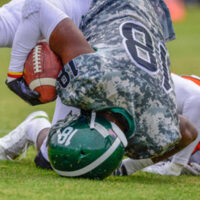What’s California’s Concussion Law For High School Athletes?

Many children are drawn to sports at a young age, so some will be quite serious about participating and competing by the time they reach high school. Of course, there is always the risk of injury with physical activity, especially with certain athletics like football, wrestling, cheerleading, and basketball. Statistics from the US Centers for Disease Control and Prevention (CDC) reveal the frequency of traumatic brain injuries (TBIs) in particular among young players. Every year, around 283,000 children visit hospital emergency rooms for treatment of sports-related TBI, and almost half of these head injuries are a result of contact sports.
The CDC reports that a TBI can affect the way the victim moves, acts, thinks, and feels, in the immediate aftermath and the long term. The implications are concerning for children, which is why all US states have enacted laws regarding concussions in school sports. If your child was hurt, you should consult with an Oakland traumatic brain injury lawyer about your rights and get the basics on what California’s version says.
Overview of California’s Concussion Law: The state statute on concussions covers a combination of reporting, notifications to parents, and protocols on returning to the activity that caused the injuries. The following points apply to any school that offers an athletic program:
- Every year, parents must sign and return a concussion and head injury information sheet about the risks of TBI. This document must be completed before the student athlete practices or competes in the sport or activity.
- An athlete suspected of sustaining a TBI or concussion during participation in sports must be immediately removed from that activity for the rest of the day.
- Before being allowed to return to the activity, the student athlete must be evaluated by a physician who is trained in concussion management. This health care provider must give written clearance to return.
- If the physician determines that the person did suffer TBI, there must be a graduated return to the activity over a period of at least 7 days. The process must be supervised by a health care provider.
- Every 2 years, coaches of student sports are required to undergo training about concussion management and safety.
Long-Term Effects and Post-Concussion Syndrome: It is encouraging that California lawmakers take TBI and head injuries among young athletes so seriously, since the consequences can be serious. The short-term implications, such as headache and dizziness, will usually resolve within a few days. However, a person can suffer from post-concussive syndrome, symptoms of which include:
- Fatigue and difficulties falling asleep;
- Sleeping too much;
- Depression and anxiety;
- Irritability and mood swings;
- Issues with concentration;
- Memory loss;
- Blurred vision; and,
- Ringing in the ears.
Contact an Oakland Traumatic Brain Injury Attorney About Legal Remedies
Laws about children returning to sports after a TBI or concussion are useful in protecting young athletes, but only if they are strictly enforced. To learn more about your options if your child suffered head injuries, please contact Venardi Zurada, LLP. We are happy to schedule a no-cost case review at our offices in Oakland, or Walnut Creek, CA.
Source:
cdc.gov/injury/erpo/icrc/stories_research_impact.html#Concussion-Nationwide-Ohio
